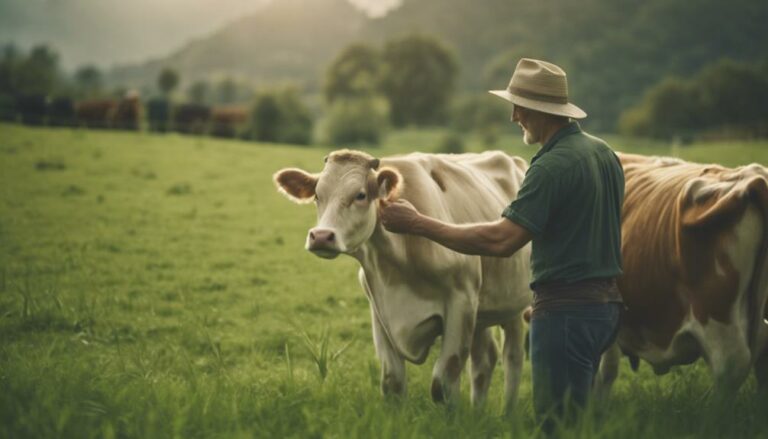When handling organic livestock, remember to use gentle hands. This technique is essential for ensuring animal welfare, reducing stress levels, and enhancing productivity. Consistent and slow movements help build trust while creating a calm environment. Understanding animal behavior, including their blind spots and unique perspectives, is key. By prioritizing the well-being and comfort of your livestock, you establish trust and cooperation. This approach leads to improved welfare, healthier animals, and increased profitability. Embracing gentle handling techniques will benefit both you and your livestock in the long run.
Key Takeaways
- Slow movements prevent startling and reduce stress.
- Calm demeanor creates a peaceful environment for livestock.
- Understanding natural behavior fosters a harmonious relationship.
- Prioritize well-being and comfort of organic livestock during handling.
- Establish trust and cooperation through gentle handling techniques.
Importance of Gentle Handling
The significance of gentle handling in organic livestock management can't be overstated. On a certified organic farm, the well-being of animals is paramount, and gentle handling plays a vital role in ensuring their welfare. By employing gentle handling techniques, stress levels in organic livestock are reduced, leading to improved production outcomes and better overall animal welfare.
Organic standards often mandate that livestock be treated with respect and care, emphasizing the importance of gentle handling practices. Understanding the psychology of animals is key to implementing effective and humane handling techniques in organic livestock operations. Research has shown that gentle handling results in calmer and more cooperative animals, making routine tasks such as health checks and handling much easier and safer for both the animals and handlers.
Building Trust With Livestock
To establish trust with livestock in organic farming, employ consistent and gentle handling techniques to foster a positive relationship. Handling animals with care and respect is essential in reducing stress and fear, ultimately improving the well-being of the livestock. One effective way to build trust is by using slow and deliberate movements during interactions. This approach helps create a calm environment and signals to the animals that they are safe. Developing a routine and predictable handling process can further strengthen the bond and instill confidence in the livestock. Providing proper care, attention, and respect are fundamental aspects of handling organic livestock, enhancing the trust between handlers and animals. Effective communication through body language and understanding the animals' behavior plays a significant role in establishing trust and creating a harmonious relationship.
| Key Points | Benefits |
|---|---|
| Consistent Handling | Reduces stress and fear |
| Slow Movements | Creates a calm and safe environment |
| Routine and Predictability | Strengthens bond and boosts confidence |
| Proper Care and Respect | Enhances trust and handling outcomes |
Understanding Animal Behavior
Understanding animal behavior is essential in organic livestock management as it influences handling practices and overall welfare. Animals have blind spots and unique perspectives that can impact how they react to stimuli, making it important for handlers to anticipate their movements and adjust accordingly.
By recognizing and respecting these differences, you can create a safer environment for both the animals and yourself. Additionally, handling baby animals with care is important as it can shape their behavior as adults. When interacting with livestock, it's important to be observant and attentive to signs of fear, as addressing these cues promptly can prevent stress and potential injuries.
Effective lighting and facility layout are also key factors, as they can either facilitate or hinder the animals' movement and stress levels. Remember to stay calm and employ gentle handling techniques to improve animal welfare and minimize stress during organic livestock management. By seeing things from the animals' perspective and staying calm, you can create a harmonious environment that promotes positive behavior and overall well-being.
Techniques for Low-Stress Interaction
Implementing techniques for low-stress interaction with organic livestock involves utilizing slow movements and maintaining a calm demeanor to minimize stress. When handling organic livestock, it's imperative to prioritize their well-being and comfort to establish trust and cooperation. Here are key strategies for ensuring gentle handling:
- Utilize Slow Movements: Moving slowly around organic livestock helps prevent startling them and reduces their stress levels.
- Maintain a Calm Demeanor: Remaining calm and composed during interactions conveys a sense of security to the animals, promoting a peaceful environment.
- Understand Natural Behavior: Observing and understanding the natural behavior of the animals allows you to adjust your handling techniques accordingly, fostering a more harmonious relationship.
Benefits of Gentle Hands Approach
Observing the benefits of employing a gentle hands approach in handling organic livestock reveals significant improvements in animal welfare and product quality. Implementing this approach on dairy farms can lead to reduced stress levels in the animals, resulting in healthier livestock and enhanced overall well-being.
By moving away from traditional, more forceful handling methods, organic livestock can display more natural behaviors and experience less fear and distress during interactions with humans. This decreased stress not only benefits the animals but also has a direct impact on the quality of products derived from them, such as meat, milk, and eggs.
Additionally, the use of gentle hands fosters a positive relationship between the handler and the livestock, building trust and cooperation. Research indicates that this approach can ultimately increase productivity and profitability on dairy farms, making it a valuable technique for sustainable and ethical livestock management practices.
Conclusion
To summarize, practicing gentle handling techniques with organic livestock is essential for their well-being and productivity.
By building trust, understanding animal behavior, and utilizing low-stress interaction methods, you can create a harmonious environment for both you and your animals.
So, are you ready to reap the benefits of a gentle hands approach and forge a stronger bond with your livestock?

